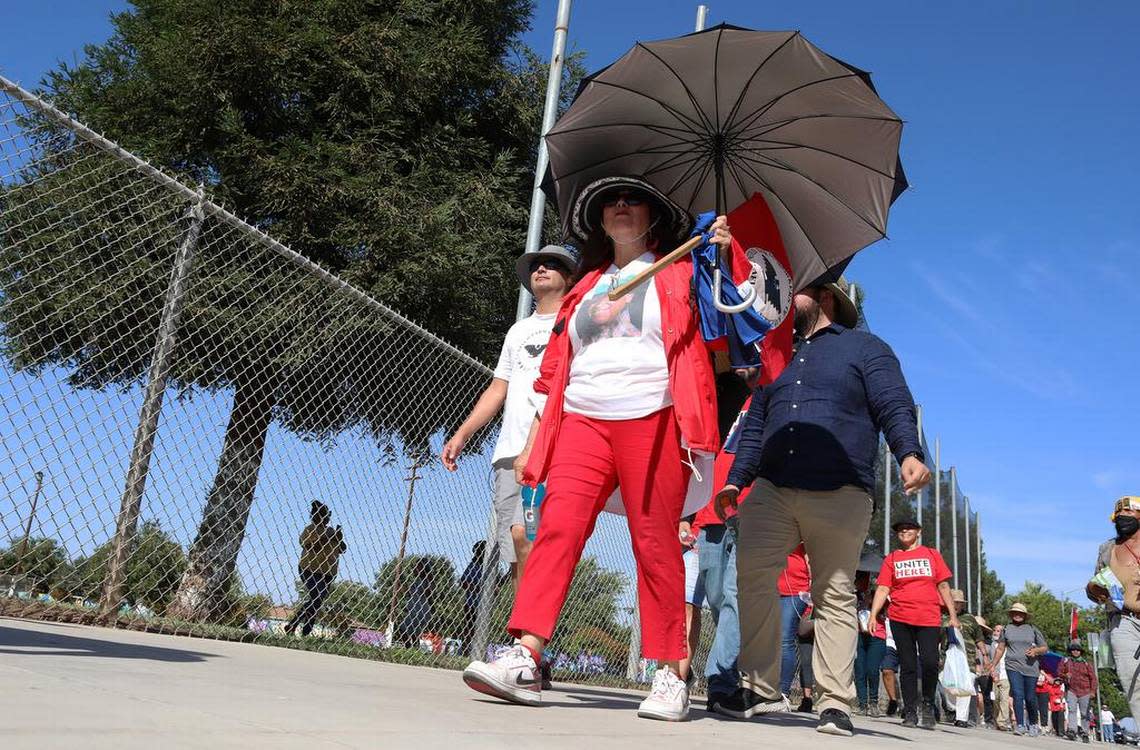Marcher began her UFW life with 1966 march at age 7
Yolanda Chacón Serna was the future of the farmworker movement in 1966 she she accompanied her mother on the historic march led by César E. Chávez from Delano to Sacramento in the midst of a showdown with growers to recognize the fledgling United Farm Workers.
She was 7 years old then.
“The most memorable moment was marching into Sacramento and seeing all the people, the power of the people, and knowing that we were making changes,” said Chacón Serna, whose mother walked out on strike at DiGiorgio Fruit Corporation along with Helen Chávez.
The Delano resident is also the present of the UFW cause.
Chacón Serna will celebrate her 63rd birthday in Stockton on Aug. 20 when she accompanies the ‘March for the Governor’s Signature’ on Day 18.
“Tengo ‘Sí se puede’ en mi sangre,” she said as she rested during the march’s Aug. 11 stop at Calwa Park. In English, she boasted of having the UFW slogan ‘Yes we can’ in her blood.
Chacón Serna, an organizer with the UFW, is one reason the farmworker union has weathered the highs of signed contracts with grape growers and the lows since 1973 when growers signed sweetheart contracts with the Teamsters.
There are scores of Chacón Sernas throughout the country who will drop what they’re doing and join a march, a rally, a picket line or knock on doors.
A dropout when she was 15, Chacón Serna got her education living through history. Her dad went to Canada to promote the UFW’s grape boycott.
“We’re in the huelga (strike), and we would get on the buses to L.A. to picket and to boycott Safeway,” said Chacón Serna. “We would walk with our parents for a little bit, then we’d get tired and they put us on the bus.”
She spent many nights sleeping on the floors of church halls, then accompanied her mother to walk precincts for Latino candidates who supported la causa.

“We’re never going to change anything unless we change the people who are making these decisions, who will represent us and advocate for us,” said Chacón Serna, who worked on Esteban Torres’ first Congressional bid in 1974.
Torres, who died in January, won his Congressional bid in 1982.
“That was my political science degree, you might say,” said Chacón Serna, who knows the intricacies of the 1935 National Labor Relations Act and how it left out farmworkers from workplace protections.
Her union was instrumental in getting California Gov. Jerry Brown to sign the Agricultural Labor Relations Act in 1975 that gave farmworkers better odds of winning union contracts.
“But now with all the different stages of Republican administrations, they’ve watered and watered it down,” said Chacón Serna. “So farmworkers, it’s true, every day get harassed sexually or intimidated.”
The ‘March for the Governor’s Signature’ is designed to get Gov. Gavin Newsom to sign AB 2183, a bill he vetoed last year that would allow farmworkers to cast unionization ballots by mail instead of having to do so at the worksite.
“The bosses have their families there, so they know who’s with the union,” she said. “By the time there’s an election, it’s not free or fair.”
Yes, the 24-day march through the backbone of the San Joaquín Valley has seen the likes of UFW President Teresa Romero, former president Arturo S. Rodríguez, UFW co-founder Dolores Huerta, César Chávez Foundation President Paul Chávez, and Roberto Bustos (who organized the 1966 march at César E. Chávez’s behest).
Politicians like state Sen. María Elena Durazo, Assemblymember Joaquín Arámbula and Tulare County Supervisor Eddie Valero have walked with the marchers at some point. Even Bishop Joseph V. Brennen of the Catholic Diocese of Fresno has joined the march.
But it is loyalists like Chacón Serna who will make the march a success.
“I’m the semilla (seed) that they planted,” she said.
Juan Esparza Loera is the editor of Vida en el Valle.
